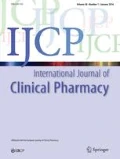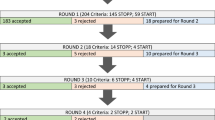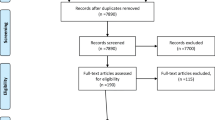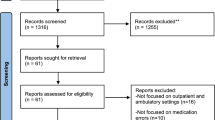Abstract
Objective: Market research, and more recently health services research, has adopted the concept of the ‘new consumer’ to describe customers/patients who are becoming more demanding. This study aims to determine the relevance of the concept ‘new consumer’ for pharmacy practice, in light of the theory of ‘risk society’.
Method: Qualitative in-depth interviews were carried out with seven pharmacy technicians from six different pharmacies in the Copenhagen area, Denmark. They were asked to describe developments, over time, in consumer behaviour. They were asked to focus on three themes: information, the authority of the pharmacy staff, and their predictions of the future pharmacy customer.
Results: Young customers, particularly parents of pre-school children, as well as the chronically ill appeared to share the characteristics associated with the ‘new consumer’. They were: information strong (well-informed) and information seeking (inquisitive); asked critical questions; showed a desire to initiate dialogue; sought counselling and in general no longer blindly accepted the authority of the pharmacy staff.
Conclusion: According to pharmacy technicians a ‘new consumer’ does exist and is visible in community pharmacies in Copenhagen. Seen in light of the theory of risk society, we further conclude that the behaviour of the ‘new consumer’ is indicative of an attempt to minimize risk of drug therapy.
Similar content being viewed by others
References
Lewis D, Bridger D. The soul of the new consumer-authenticity what we buy and why in the new economy. London: Nicholas Brealey 2000.
Winkler F. Consumerism in health care: beyond the supermarket model. Policy Polit 1987; 15 (1): 1–8.
Herzlinger RE. Market-driven health care: who wins, who loses in the transformation of America's largest service industry. New York: Addison-Wesley Publishing, 1997.
Weiss M, Fitzpatrick R. Challenges to medicine: the case of prescribing. Soc Health Illness 1997; 19: 297–327.
Morgall JM, Almarsdóttir AB. The new consumer-implications for pharmacy. Int J Pharm Prac 1999; 21: 198–201.
Nettelton S. The sociology of health and illness. Cambridge: Polity Press 1995.
Hassell K, Noyce P, Rogers A et al. Advice provided in British community pharmacies-what people want and what they get. J Health Serv Res Policy 1998; 3 (4): 219–25.
Hibbert D, Bissell P, Ward PR. Consumerism and professional work in the community pharmacy. Sociol Health Ill 2002; 1(24): 46–65.
Beck U. Risk Society: Towards a new modernity. London: Sage 1992.
Møldrup C. Risk of future drugs-expert and citizen perspectives. Copenhagen: The Royal Danish School of Pharmacy 2000.
Møldrup C, Morgall JM, Almarsdóttir A. Perceived risk of future drugs-a Danish citizen Delphi. Health Risk Soc 2002; 1 (4): 5–17.
Abraham J, Sheppard J. Democracy, technocracy, and the secret state of medicines control: expert and non-expert perspectives. Sci Technol Hum Val 1997; 22 (2): 139–67.
Lidskog R. In science we trust? Acta Sociol 1996; (9): 31–56.
Blaxter M, Britten N. Lay beliefs about drugs and medicines and the implications for community pharmacy. A review paper. Pharm Pract Res. The Resource Centre 1997.
Morgall Traulsen JM, Almarsdóttír AB, Björnsdóttir I. The lay user perspective on the quality of pharmaceuticals, drug therapy and pharmacy services. Pharm World Sci 2002; 24 (5): 196–200.
Almarsdóttir AB, Morgall JM, Björnsdóttir I. A question of emphasis: efficiency or equality in the provision of pharmaceuticals. Int J Health Plann Manag 2000; 15: 149–61.
Edwards T. Contradictions of consumption. Buckingham: Open University Press 2000.
Kvale S. InterViews-an introduction to qualitative reserearch interviewing 1996. London: Sage Publications.
Airaksinen, M. Customer feedback as a tool for improving pharmacy services in Finland (dissertation). Kuopio University: Department of Pharmaceutical Sciences 1994.
Britten N. Patients' ideas about medicines: a qualitative study in a general practice population. Br J Gen Pract 1994: 44 (387): 465–8.
Britten N. Lay views of drugs and medicines: orthodox and unorthodox accounts: In Williams S, Calnan M (eds) Modern medicine-lay perspectives and experiences. London: UCL Press 1996: 48–73.
Author information
Authors and Affiliations
Corresponding author
Rights and permissions
About this article
Cite this article
Traulsen, J.M., Noerreslet, M. The new consumer of medicine — the pharmacy technicians' perspective. Pharm World Sci 26, 203–207 (2004). https://doi.org/10.1023/B:PHAR.0000035883.44707.6e
Issue Date:
DOI: https://doi.org/10.1023/B:PHAR.0000035883.44707.6e




